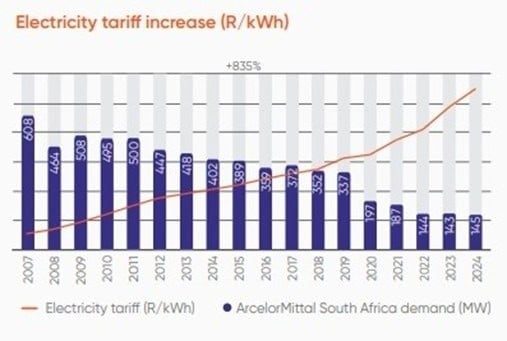Saying the bank misled the courts in attempting to repossess his late father’s Roodepoort property.
Aubrey Larkins has lodged charges of perjury and defamation against Absa for claiming his parents were delinquent in repaying their home loan account after discovering not only were they not in arrears – they were in credit.
The bank had attempted to foreclose on the property in 2015, claiming the Larkins were R187 000 in arrears on three mortgage bonds, but when Aubrey – a seasoned financial professional – looked into the matter, he found the accounts were more than R22 000 in credit. By that time, family members had clubbed together and paid off the arrears to avert foreclosure.
Charging a bank for defamation over an accusation of debt delinquency is a novel approach, and it remains to be seen how this works out.
Larkins says he has no financial interest in bringing these charges against Absa, other than to highlight what he sees as systemic failure in the institutions created to protect consumers – from the Banking Ombud to the National Credit Regulator (NCR) and National Credit Tribunal (NCT).
Cases brought before these bodies are supposed to prevent disputes clogging the courts, but in this case, he says they failed in spectacular fashion.
Absa responds that it followed due process in line with court rules at all times (see response below).
ALSO READ: Court rules in favour of clients in Standard Bank home loan dispute
Here’s what happened …
The story goes back to 1978 when Aubrey’s parents bought a house in Roodepoort, west of Johannesburg, financed by his father’s employer.
As part of a severance package in 1990, the Larkins were required to approach a bank (Absa) to take over the outstanding balance on the home loan. Over the next few years, they ran into financial difficulty and secured a total of three mortgage bonds. By 2005, the total debt owed was R188 118.
When Aubrey looked into the accounts in 2009, he found the debt had barely shifted over the preceding four years, with an amount of R187 000 still owing.
The first three bonds on the property had run for between 15 and 19 years. That made no sense, so he started to write to the bank, while taking over his parents’ monthly home loan instalments.
Absa supplied bank statements back to 1992, but did not provide the reconciliation he required to explain how the outstanding debt could remain so high after more than 15 years of payments.
He asked for copies of the original loan agreements, but these were supposedly destroyed in a fire.
ALSO READ: Court reverses home repo judgment after Nedbank bungled calculations
Seeking help beyond the bank
Not satisfied with the responses from the bank, he then reached out to the NCR for help in 2010 but was told it would not take on any disputes older than three years.
He was told he would be given a “non-referral” notice by the NCR, which would allow him to take the matter up with the National Consumer Tribunal. That never happened.
Further attempts to seek legal redress from Legal Aid and lawyers acting pro bono came to nought.
In 2014 he launched an application with the National Consumer Tribunal asking that the Absa accounts be frozen until such time as the case could be heard by a proper authority.
The matter was set down to be heard by the tribunal in January 2015.
ALSO READ: Smackdown for Standard Bank in home repo case
Bank’s lawyers
A few days later, Absa’s attorneys, Strauss Daly, served summons on the Larkins to appear in the North Gauteng High Court for non-payment of their account. Section 130 of the NCA specifically prevents credit providers from proceeding with debt enforcement while matters are pending before the National Credit Tribunal.
Apparently undeterred, Strauss Daly and Absa applied to the court for summary judgment, claiming that the matter was unopposed (it wasn’t).
Absa’s case was brought in the Pretoria High Court rather than Joburg, where the property is located – an attempt to frustrate justice, argues Aubrey.
It didn’t help that the Larkins made use of incompetent or conflicted attorneys who failed to pass on correspondence from the bank.
This left them blind to the incoming judicial missile, with the court granting summary judgment against them in March 2015.
A little over a week later, the local sheriff turned up at the door with a warrant of execution on the property – which precedes a public auction.
Aubrey complained to the Law Society of the Northern Provinces (LSNP) about the attorneys on both sides, but that didn’t go anywhere. A principle undergirding our legal system is the right of a respondent to be properly served with a complaint and given time to prepare a defence.
What about the outstanding NCT complaint which should have frozen the high court legal process?
When the matter came before the tribunal, the bank’s legal representatives from ENS appeared shocked and requested time to step outside the court to contact their clients.
When they returned, they claimed this was conducted unknowingly by another division of the bank’s legal department.
The matter was dismissed by the NCT on the basis that it was subject to a superseding judgment in another court. Soon thereafter, a family member stepped up and paid the outstanding arrears.
ALSO READ: Gauteng man takes Absa to court over alleged unlawful car repossession
Judgment rescinded
With the property now safe from foreclosure, Aubrey decided this was the time to pounce and reverse what he saw as the injustices of the previous years.
He approached the court in 2022 for a rescission of the 2015 judgment against his parents.
This was granted, along with an instruction to the bank to pay the Larkins the overpayment of R22 447.
He then asked the Bank Ombud to look into the interest charges on the account. There were no original documents to analyse (the ones apparently destroyed in a fire), but the Larkins stuck to their claim that interest rates were fixed – the bank arguing they were floating – leaving plenty of room for dispute.
The ombud responded that his hands were tied until Absa willingly agreed to withdraw the 2015 complaint before the high court, despite the judgment being rescinded.
Aubrey’s father passed away in 2021 after a long illness made worse by the couple’s inability to afford private healthcare.
“This is a case riddled with irregularities, lies and neglect by the institutions intended to protect consumers,” says Aubrey.
“I asked for assistance from every single institution intended to protect us and got nowhere, and I am very familiar with the law and finances. What chance does someone less knowledgeable have when faced with similar circumstances?”
Absa’s response
Moneyweb reached out to Absa for comment and received this response from Nondumiso Ncapai, managing executive at Absa Home Loans.
“Thank you for bringing this documentation to our attention.
“We have investigated the matter, and we are comfortable that due process was followed in line with the court rules.
“While we cannot discuss details of customer matters with third parties, we welcome the opportunity to engage Mr Larkins directly to create any further clarity he may require.”
This article was republished from Moneyweb. Read the original here.














